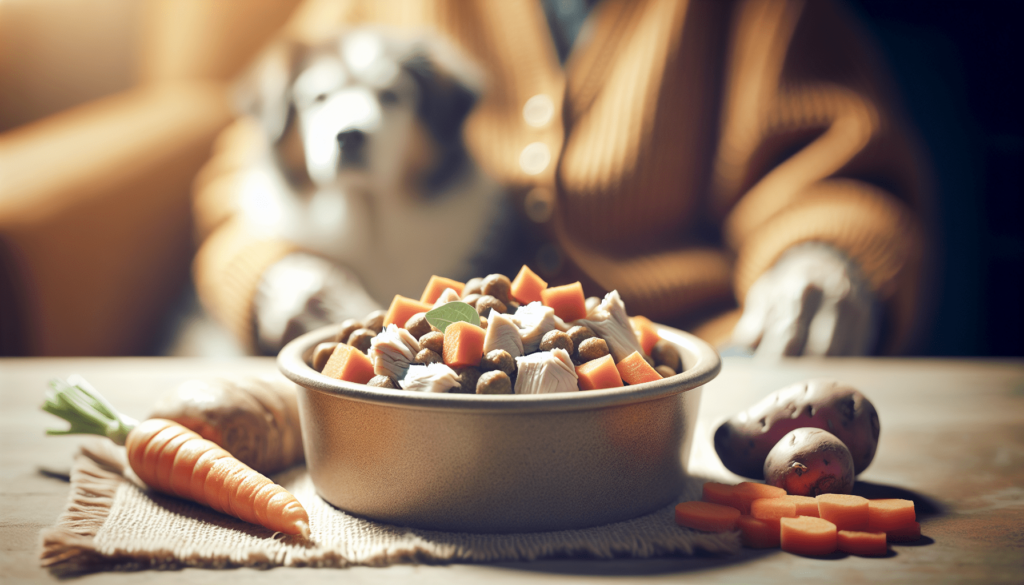Have you ever wondered what are the best dog foods for senior dogs? As our beloved furry companions grow older, their dietary needs begin to change, and it’s crucial to provide them with nutrition that supports their health and longevity. In my heart and home, dogs are more than just pets—they’re family. So, naturally, I want to ensure that I’m giving my aging pup the best possible care, including high-quality food to keep them happy and healthy in their golden years.

Understanding the Dietary Needs of Senior Dogs
Lifespan and Aging in Dogs
Let’s talk about the aging process in dogs. Just like us, dogs undergo various changes as they age. These changes can be physical, like joint stiffness, or they can be internal, affecting organ function. Generally, dogs are considered ‘senior’ when they reach about the last quarter of their expected lifespan, which typically ranges from seven to ten years or older. It’s during this time that certain dietary adjustments can make a significant difference in their quality of life.
Nutritional Needs for Senior Dogs
Nutrition plays a pivotal role in keeping senior dogs vibrant and active. Older dogs often require fewer calories due to a decrease in physical activity and a slower metabolism. However, their need for certain nutrients like protein, fiber, and antioxidants may increase to support muscle maintenance, digestive health, and immune function.
The Role of Protein
Protein is essential for maintaining muscle mass in senior dogs. Despite the common myth that older dogs need less protein, the reality is quite the contrary. High-quality protein sources that are easily digestible can help in preserving muscle and supporting recovery from any injuries that may occur as they grow less agile.
Healthy Fats and Their Benefits
Including healthy fats in the diet of senior dogs can aid in cognitive function, which is a concern for aging pets. Essential fatty acids, such as Omega-3 and Omega-6, contribute to the overall health of their coat and skin, too. Thus, a balanced intake of fats is beneficial in myriad ways.
Fiber for Digestive Health
Senior dogs benefit greatly from increased fiber content in their diet. Fiber helps in promoting a smooth digestive process and preventing constipation, a common issue for older dogs. However, it’s important not to overdo it, as excessive fiber can lead to nutrient absorption problems.
Key Vitamins and Minerals
Vitamins and minerals also play significant roles in the overall health of senior dogs. For instance, vitamin A supports vision, while vitamin E and selenium are crucial for immune health. Calcium and phosphorus are equally important for maintaining strong bones.
Evaluating Dog Foods for Senior Dogs
Types of Dog Foods Available
When it comes to selecting dog food for senior dogs, there’s no one-size-fits-all solution. Instead, it requires careful consideration of different types of dog foods available in the market.
Dry Kibble
Dry kibble is a popular option because it’s convenient to store and easy to serve. Good-quality kibble for senior dogs often includes ingredients that address joint health and support digestion. It also aids in keeping their teeth clean, a bonus for maintaining oral health.
Wet Food
Wet food can be particularly appealing to senior dogs who may have become picky eaters or have dental issues making chewing difficult. Wet food offers higher moisture content, which can be beneficial for dogs who might not drink enough water throughout the day.
Homemade Diets
Preparing home-cooked meals for your senior dog can be rewarding, and it allows for complete control over ingredients. However, it’s vital to consult with a veterinarian or a pet nutritionist to ensure that the homemade diet is balanced and meets all nutritional requirements.
Evaluating Ingredients
When choosing a dog food for your senior dog, scrutinizing the ingredient list is essential. Here’s what to look for:
- Quality Protein Sources: Opt for meats like chicken, fish, or lamb, where protein is not only the first ingredient but is also specified.
- Whole Grains and Vegetables: These are excellent sources of energy and fiber. Avoid fillers like corn or soy that have little nutritional value.
- Natural Preservatives: Choose foods that use natural preservatives such as vitamin E or vitamin C instead of artificial ones.
Supplementation
When standard dog food doesn’t seem to suffice, supplementation may be necessary. Supplements such as glucosamine and chondroitin are often recommended for supporting joint health, while probiotics can aid in digestion.

How to Choose the Best Dog Food for Your Senior Dog
Consult Your Veterinarian
The first step in selecting the right food is consulting with your veterinarian. Your vet can provide valuable insights into the specific nutritional needs of your senior dog based on their health history and current condition.
Assess Specific Health Needs
Different dogs age differently, and health conditions may arise that require special dietary considerations. For example, if your dog has kidney issues, a low-protein diet might be advisable. Similarly, dogs with arthritis may benefit from foods rich in Omega-3 fatty acids.
Budget Considerations
While premium brands might offer superior nutrition, it’s crucial to balance quality with affordability. There are numerous high-quality dog foods available in various price ranges, so finding one that fits your budget without compromising on nutrition is possible.
Transitioning to a New Food
If you’ve found a new food, it’s essential to transition your dog gradually to avoid gastrointestinal upsets. Start by mixing a small amount of the new food with their current food, gradually increasing the new food’s proportion over a week or two.
Recommended Dog Food Brands for Senior Dogs
Brand Analysis Through a Comparative Table
Choosing the right brand can be overwhelming with the plethora of options available. Here’s a look at a few highly recommended brands that cater to senior dogs:
| Brand | Type | Key Benefits | Average Price |
|---|---|---|---|
| Hill’s Science Diet | Dry/Wet | Balanced nutrition, support for joint and heart health | Medium |
| Blue Buffalo | Dry/Wet | Rich in antioxidants and real meats as primary ingredients | Medium-High |
| Nutro Ultra | Dry | Focus on whole foods with a mix of lean proteins | Medium |
| Wellness Complete | Dry/Wet | Supports immune system with omega fatty acids and antioxidants | Medium-High |
| Purina Pro Plan | Dry/Wet | Tailored for various health needs, rich in protein | Medium |
Hill’s Science Diet
Hill’s Science Diet offers both wet and dry food options that are specifically tailored for older dogs. The brand focuses on balanced nutrition to support joint health and aid cardiovascular function, making it a favorite among vets.
Blue Buffalo
Blue Buffalo uses real meats such as chicken or fish as the first ingredient and pairs it with plenty of antioxidants derived from fruits and vegetables. It aims to provide senior dogs not only with protein but also with immune support.
Nutro Ultra
Known for its whole-food approach, Nutro Ultra combines lean proteins with whole grains and fruits that support overall health. This option is suited for dog owners who prefer natural ingredients.
Wellness Complete
Wellness Complete creates formulas that promote a strong immune system through a mix of Omega fatty acids and antioxidants. It’s an excellent choice for keeping senior dogs healthy and vibrant.
Purina Pro Plan
Purina Pro Plan provides a range of foods suited to meet different health needs of senior dogs, such as mobility support or weight management. Rich in protein, it’s an option that caters to specialized dietary requirements.
Tips for Maintaining Your Senior Dog’s Health
Regular Vet Checkups
Routine vet visits are crucial for catching potential health issues early and adjusting dietary needs accordingly. Consistent checkups will ensure that your dog’s dietary needs align with their physical health.
Exercise and Mobility
Maintaining a routine exercise regimen helps manage weight and keep joints functioning well. Whether it’s a slow morning walk or some gentle playtime, physical activity should be part of their daily routine.
Hydration is Key
Keeping your senior dog hydrated is more important than ever. Ensure that fresh water is always available and watch for signs of dehydration, especially if they’re on a dry kibble diet.
Monitoring Weight
Weight management is crucial. Overweight dogs are at higher risk of health issues like diabetes and joint pain. Track their weight and make dietary adjustments as necessary to maintain a healthy weight.
Common Questions about Dog Foods for Senior Dogs
What is the difference between regular dog food and senior dog food?
Senior dog foods are formulated with lower calories and higher fiber content to accommodate the decreased activity levels and slower metabolism common in older dogs. They may also include specific nutrients aimed at joint health and digestive support.
Should I add supplements to my senior dog’s diet?
Supplementation could be beneficial, especially for joint health and digestion. Consult with your vet before adding supplements to ensure they are necessary and that the dosage is correct.
How often should I feed my senior dog?
Typically, senior dogs should be fed twice a day, but the amount and frequency can vary depending on their health and dietary needs. It’s important to monitor their appetite and make adjustments as necessary.
Is it okay to mix wet and dry food for senior dogs?
Mixing wet and dry food can offer the best of both worlds by providing variety and texture in their diet while ensuring they are well-nourished. Just ensure both types of food complement each other nutritionally.
In conclusion, finding the best dog foods for senior dogs is a deeply personal process that hinges on understanding your pet’s individual needs, being mindful of their health conditions, and consulting with professionals. With the right balance of nutrition, exercise, and love, we can help our furry friends enjoy their senior years with the vigor and comfort they deserve.



